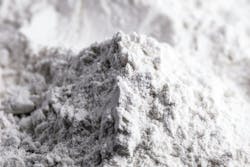Q&A: Titanium dioxide safety and regulation in foods and pharmaceuticals
Titanium dioxide (TiO2) has been widely used for decades as a colorant in cosmetics, medicines, and foods due to its bright white color and opacity. In 2022 the European Commission banned the use of TiO2 in foods and dietary supplements based on concerns raised by the European Food Safety Authority (EFSA).
In a May 6, 2021, post on the authority’s website, the chair of its Panel on Food Additives and Flavourings is quoted as saying, “Taking into account all available scientific studies and data, the panel concluded that titanium dioxide could no longer be considered safe as a food additive. A critical element in reaching this conclusion is that we could not exclude genotoxicity concerns after consumption of titanium dioxide particles. After oral ingestion, the absorption of titanium dioxide particles is low; however, they can accumulate in the body.”
This EU ban could potentially extend to include the use of TiO2 in pharmaceuticals as early as next year as well.
Processing recently spoke with David Schoneker, president and owner of Black Diamond Regulatory Consulting, about the EU ban and the regulatory outlook for TiO2 in the US and around the world. Black Diamond Regulatory Consulting is an independent firm specializing in providing regulatory and quality consulting for the pharmaceutical, dietary supplement, food, and related industries.
(Note: This conversation has been edited for space and clarity.)
Q: You coauthored a position paper published earlier this year by the Product Quality Research Institute (PQRI) arguing that the science does not support the EU's concerns about the potential risks of titanium dioxide. What did the EFSA get wrong in its evaluation? And what does the science say about the safety of titanium dioxide in foods and pharmaceuticals?
A: They focused their evaluation on nano grades of TiO2 that have nothing to do with the food and pharmaceutical grades that we all use and have been exposed to for a hundred years. The nano grades are special grades of TiO2 that primarily have been engineered for things like catalyst use. None of the nano grades are used as a pigment in foods and drugs because they're too small to have any coloring properties. Part of the reason EFSA did that is that the grades for foods and drugs have always contained a certain portion of nanoparticles as part of their particle size distribution. They've been there forever, we've all been exposed to them, probably every day of our lives when we've eaten foods and drugs that contain TiO2. And not once has anybody ever found an adverse event that was tied to the use of food and drug grade TiO2.
In Europe, and particularly in France, there is a lot of concern about nanoparticles. This got into the discussion in ways that I don't believe were really based on good science, but it focused EFSA’s attention on the nano grades. And on some of the nano grades, there were outstanding data gaps. There aren't data gaps on the food and drug grades, but EFSA deprioritized the food and drug grades in their assessment and focused on these uncertainties about nano grades.
Many regulators and experts around the world have looked at these studies and the EFSA Opinion and come to completely different conclusions about the science. In fact, numerous additional studies have come out designed to answer the questions on the nano grades, and these studies have all shown that, even with the nano grades, there are no genotoxicity issues.
Q: Your PQRI position paper also discusses the implications of a TiO2 ban in pharmaceuticals sold in the EU. How would such a ban impact the pharmaceutical industry and its ability to supply critical medicines to patients and consumers in Europe and beyond? What's different about a pharma ban compared to a ban in foods and dietary supplements?
A: There is no good alternative for TiO2 that has the properties we need, not only for food and dietary supplements, but even more so for pharmaceuticals. The primary property that gives TiO2 its benefits is that it’s a very opaque material. Calcium carbonate is probably the best substitute but has nowhere close to the opacity of TiO2. So, any reformulation effort is going to be extremely difficult and not even possible for some drug products.
In Europe alone, there are 91,000 drug products that contain TiO2 that would have to be reformulated if there were to be a ban on pharmaceutical uses in Europe. If there really was a safety concern with TiO2, everybody would say, “We have to do what we have to do, and we'll make the best of it.” But since there really isn't any safety concern, this question of reformulating 91,000 drug products really comes into play.
Many APIs (drugs) are very light sensitive, and one of the main reasons you put a coating on a tablet is to protect the API from light. With a TiO2 coating, generally you’ll be able to achieve opacity with about 3% weight gain from the film coating. To get a similar, though not as good, coating with an alternative material would require around 7 to 9% or more of weight gain on the tablet.
Many drug products would not end up with the same properties they have currently. You might be okay with certain immediate-release products, but when you start to get into modified-release products, the level of the coating is critical to the release of the drug. Right now, there really are no alternatives that work well in any sort of modified-release application. It's not even possible to reformulate those products at this point.
Some pharmaceutical industry associations estimate that it would take between half a million and 1.5 million euros to reformulate a product because it is not only the technical reformulation, but also stability studies, validation studies, as well as regulatory post-approval change notification and submission, which takes a lot of regulatory resources as well.
Industry experts have estimated that to try to reformulate all these products in Europe, it would cost 30 to 35 billion euros, if it was even physically possible. That cost will obviously get passed on to the consumer with increased drug prices. It will also impact manufacturing because, if you have to apply 2 or 3 times as much coating as you did before, your plant’s manufacturing capacity has just been lowered by 2 or 3 times. Chances are, you won't be able to make nearly as much product with the equipment you have, which would impact plant capacity significantly.
But the impact I want to stress is the patient impact due to drug shortages and availability of medicines in Europe. Many companies have already said that they have no intention of reformulating products just for Europe unless there's an economic model that makes it worthwhile. For many older drugs, lower-volume drugs, special populations, pediatric drugs, and orphan drugs, there is no economic justification to reformulate, especially when TiO2 is still okay in almost all the rest of the world. Many companies would simply withdraw drugs from Europe, and those European patients would no longer have many of the drugs that they need for their health.
With foods, you don't have some of the same light stability issues because shelf life is usually weeks or months instead of years like you have in pharma. Also, food companies reformulate products all the time. There's no regulatory approval process or stability and validation studies, etc. Plus, they may have the ability to use other things that don't have precedence of use in the pharmaceutical industry.
It's not that it's not a big deal for foods. It was a real struggle and a lot of cost for food companies to reformulate where they have. That's why many food companies didn't reformulate some of their products and just sell them outside of Europe.
Dietary supplements are kind of in the middle. It's more flexible to make formulation changes, because you don't have the same kind of regulatory approval process as you do with drugs. But many of the technical challenges are very similar to what is seen with drugs, because dietary supplements are also tablets and capsules. That's why the food ban in Europe has created significant challenges for dietary supplement companies, and some no longer sell certain products in Europe.
Q: The EU ban has prompted other regulatory agencies to reevaluate TiO2 and issue statements about its safety. Which agencies have done so, and what have they concluded following that process?
A: Health Canada did a very detailed assessment of TiO2 safety after the EU ban. They looked at everything that EFSA looked at and additional data that they requested, which EFSA didn't do, and Health Canada totally disagreed with the concerns the EFSA Opinion brought up. They didn't see any significant safety concerns and published a report on their website that says they have no intention of taking any sort of regulatory action on TiO2 in Canada based on this data.
In Australia and New Zealand, FSANZ, their regulatory agency on the food side, did a similar evaluation and published a report on their website that came to the same conclusion. They disagreed with the EFSA Opinion. They looked at all the data. They didn't see any a concern and have no intention of taking any action.
In the UK, which is no longer part of Europe, they have their own regulatory agency, the FSA, that does their food evaluations. They looked at this Opinion and also came to a different conclusion and published an interim report on their website that said they disagreed with the EFSA Opinion. They saw no safety concerns and, in fact, were extremely critical of the EFSA Opinion, saying that EFSA was unnecessarily scaring consumers without justification.
In the US, the FDA looked at everything EFSA looked at as well as a lot of additional data they requested, and though they haven't published an official report like we saw in Canada and New Zealand, they did an interview for a food magazine (Food Navigator) that basically said they disagreed with the EFSA Opinion and didn't see any problem as long as you meet the current criteria for TiO2, which is a 1% limit. The Titanium Dioxide Manufacturers Association (TDMA) then asked them if they would provide a specific statement on this, and the FDA gave TDMA a statement they could publish on their website that basically says that the FDA doesn't have a concern with TiO2 safety.
Interestingly, last year, some consumer groups filed a color additive petition with the FDA to try to get TiO2 banned. The FDA has not come out with their formal position on that petition yet, but on March 4th, 2024, they published a new page on the FDA website called "Titanium Dioxide as a Color Additive in Foods" in which they state that FDA doesn't have any concerns about the safety of TiO2.
Finally, the ban in Europe triggered the Joint Expert Committee on Food Additives (JECFA) — the WHO/FAO group of world-class toxicologists that do the safety evaluations for food additives that most countries use as a basis for their assessments — to do their own reevaluation. Late last year, JECFA published their Opinion and not only said that they don't see any concern about TiO2 safety and don’t agree with the EFSA Opinion, but that they were going to reconfirm their ADI for TiO2 of “not specified.” For JECFA, an ADI of not specified is the highest level of safety. That means they feel it's so safe, there's no reason to have an upper maximum on the use level other than to say, use it at good manufacturing practice.
The JECFA Opinion should be the basis for how most countries around the world look at TiO2 safety. In fact, many countries had said they weren't going to come out with their own opinions until they saw what JECFA had to say.
A few countries, primarily in the Middle East, tend to follow what Europe does, because they don't have their own experts in house to do these types of evaluations. A few Middle Eastern countries did say they were going to go forward with the ban, but we've even heard inklings behind the scenes that some of them, seeing what JECFA had to say, may reconsider.
Q: Late last year, California passed the California Food Safety Act, which bans the additives, brominated vegetable oil, potassium bromate, propylparaben, and red dye #3. An early draft of that bill also included TiO2, but it was removed prior to passage. This is the first time a US state has banned food additives that are currently permitted by the FDA, and other states, including Illinois and New York, have been considering similar legislation. What will be the consequences if US states begin to ban TiO2 on a state-by-state basis, even while the FDA continues to assert that it is safe?
A: There is absolutely no rationale for why politicians should be making decisions on food safety rather than the FDA, who has all the expertise and is legally responsible for making those decisions. And there was no additional scientific explanation justifying why this material should be banned in California, other than Europe did it.
I've already told you all the problems with the European decision, and there are problems with European decisions on some other materials on this California list as well, where there's not much justification for real safety concerns. There are a couple additives where there are some question marks, and FDA has been taking some action on these already. Maybe some would like it faster, but FDA wants to make sure they look at all the data before they make a call.
But to your point about the implications of states taking this on, it could be disastrous if we start to see a patchwork of regulation. I don't know how trade can possibly deal with different requirements on what ingredients are okay or not from state to state.
Many folks in the industry stood up for TiO2 and said there was nothing to justify banning it. And it did get removed from this legislation. But the fact that this bill went through on these other materials is still a big deal, because this is the first time that a state has challenged the FDA's authority to make food additive safety decisions, and where that could go is, frankly, really scary. You would have politicians making decisions about food safety. Frankly, they don't know what they're talking about when it comes to toxicology and safety profiles, they just take what they hear in the media and from consumer activist groups.
If we have these groups or the states taking these kinds of actions, nobody knows where this could go. You could start to see particular states want to ban additional materials beyond food additives. What happens if a state decides they don’t like an FDA-approved drug for diabetes, so they’re going to ban it? How does the country deal with that? How does the industry deal with that? The FDA has been given federal authority to make these decisions; states should respect that. If they want to argue in Congress that FDA needs more funding or should do something differently, that's fine. But that's the process for doing it, not saying, "We don't care what the FDA says, we're going to make the decision anyway."
Again, there are other states that are putting out similar bills, and I know industry is going to continue to try to work with those states. But hopefully at some point maybe the FDA or somebody will step in and do some sort of preemption to say that this needs to be done at the federal level, because that's the only place where it makes sense.
Q: In a May 8, 2023, post on its website, the Environmental Working Group said, “The Food, Drug and Cosmetics Act does not require the FDA to regularly reassess the risks of chemicals it has approved for use in food. So, decades may pass without agency reassessment of the safety of chemicals like titanium dioxide.” Setting aside the safety or potential risk of titanium dioxide, are there gaps in the current federal law that may allow additives and chemicals once considered safe to remain on the market too long after health risks have been identified?
A: I know this question comes up, and I think what they're saying is there's nothing that says the FDA has to re-review a food additive every 5 years or whatever it might be. That's true. The law does not require the FDA to reassess a food additive after X number of years. But should it? That's an awful lot of resources to go to reassessing well-known, commonly used food additives over and over again, unless you have a reason to think there might be an issue. And again, when the FDA sees any kind of evidence pop up in the literature or start to come out of the media about concerns or new study data that shows something different, FDA does look into that. They don't do it publicly, where they're out there publishing all kinds of stuff. They do those assessments to determine if there is a need to do a further big reevaluation. In some cases, there is; in some cases, there isn’t. Just doing reevaluations for the sake of doing reevaluations is a waste of time and taxpayer money, unless there's some reason to think a reevaluation might be needed.
I actually had discussions with the FDA, where they had some questions about TiO2 shortly after the EU Opinion came out. They already had a committee that was doing the reassessment process. So, the FDA was very active, but again, they don't go out and publish and say the FDA is doing a reevaluation of this because, until they see some evidence of concern, they don't want to create worry that there might be a problem.
Q: In your opinion, what can be done to improve the process and boost consumer confidence that additives and ingredients that have been approved by the FDA are indeed safe for human consumption?
A: A lot of discussions have been going on within the agency over the last year or two, especially where there's a whole reorganization effort within the FDA, because these questions have been out there about whether or not they're really on top of this and following up on various things. And the FDA has restructured how the food side of FDA is going to work going forward and has come up with new procedures that hopefully will help give consumers more confidence that these ongoing assessments are occurring. Because, again, in the past they did occur, they were just done in a more unstructured way, based on the evidence that was coming in and then doing an internal assessment.
I think, under the new structure and procedures they're establishing, there will be a little bit more formality to that and probably a little bit more public information that comes out that may help that perceptional issue. I don't think there's any concern there, but I think they need to be able to show consumers a little bit more about what they do internally, so there can be that confidence building that's necessary.
(You can listen to this entire interview by going to the “Podcasts” page on the Processing website or searching for "Ear on Processing" wherever you get your podcasts.)
David Schoneker is president and owner of Black Diamond Regulatory Consulting, an independent firm specializing in providing regulatory and quality consulting for the pharmaceutical, dietary supplement, food, and related industries.
Black Diamond Regulatory Consulting
www.blackdiamondregulatory.com



